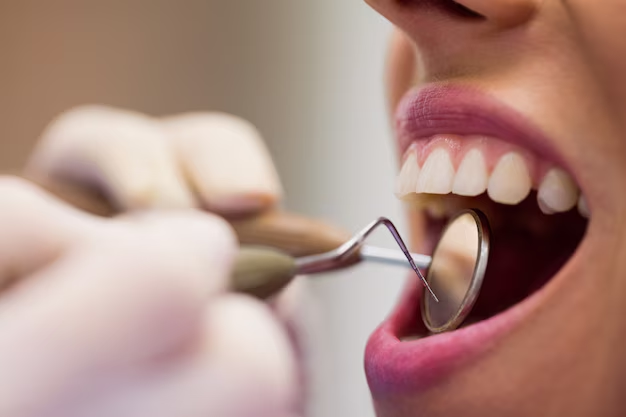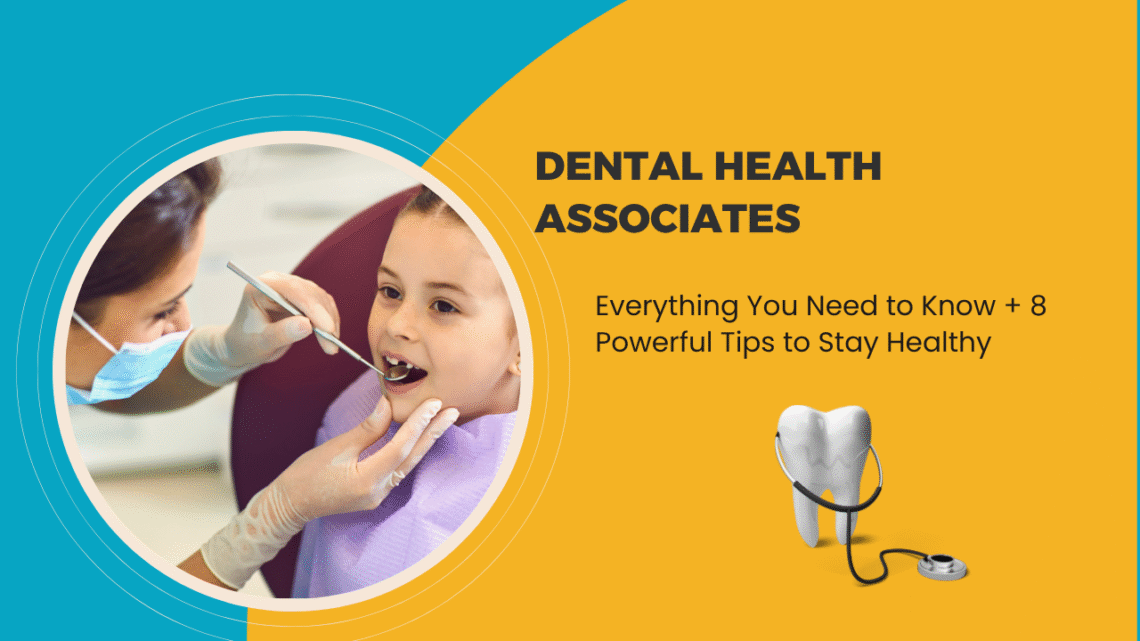Introduction
Oral health is not just about having a bright smile—it’s a vital part of your overall well-being. Your mouth is the gateway to your body, and maintaining healthy teeth and gums is essential for preventing both dental and systemic diseases. That’s where Dental Health Associates (DHA) come in. These clinics and organizations specialize in providing comprehensive oral care services, combining modern dental techniques with patient-focused care.
In this article, we’ll explore everything you need to know about Dental Health Associates, the services they offer, why they matter, and the top 8 tips to help you maintain a healthy smile for life.
What Are Dental Health Associates?

Dental Health Associates (DHA) are comprehensive dental care providers offering a full range of services in one convenient location. These professional organizations or group practices are designed to serve patients of all ages, delivering both general and specialized care in a coordinated, patient-centered environment.
A key benefit of choosing dental health associates is their team-based approach. DHA clinics typically include experienced general dentists, orthodontists, periodontists, oral surgeons, pediatric dentists, and dental hygienists. This diverse team works collaboratively to address every aspect of a patient’s oral health, from routine cleanings to complex surgical procedures.
What sets dental health associates apart is the convenience and quality of care they provide. Patients don’t need to bounce between offices for referrals; instead, they receive seamless, in-house dental care with access to the latest technologies and treatment options. DHA clinics focus on long-term oral wellness, prevention, and education—ensuring optimal results for every smile.
These groups focus on:
- Preventive care
- Diagnostic services
- Restorative and cosmetic treatments
- Emergency dental services
- Long-term oral health education
Unlike solo dental practices, DHAs emphasize continuity of care and collaborative treatment planning, often using the latest technology for superior outcomes.
Why Choose a Dental Health Associate?
Choosing a DHA offers several advantages:
1. Comprehensive Services
From routine cleanings and fillings to dental implants and orthodontics, DHAs cover it all.
2. Advanced Technology
Modern DHAs use tools like digital X-rays, 3D imaging, and laser dentistry to provide precise, efficient care.
3. Specialist Access
Need a root canal or gum surgery? DHA has in-house specialists, which eliminates the hassle of referrals.
4. Insurance & Payment Plans
Most DHAs accept major insurance providers and offer flexible payment plans, making quality dental care more accessible.
5. Continuity & Convenience
All your dental history is stored and shared among professionals within the same organization, ensuring seamless care.
Services Provided by Dental Health Associates
Here’s a breakdown of the core services you can expect from a DHA clinic:
✅ Preventive Dentistry
- Dental exams
- Teeth cleanings
- Fluoride treatments
- Sealants
✅ Restorative Dentistry
- Fillings
- Crowns and bridges
- Dentures
- Root canals
✅ Cosmetic Dentistry
- Teeth whitening
- Veneers
- Invisalign
- Smile makeovers
✅ Pediatric Dentistry
- Kid-friendly exams
- Sealants
- Early orthodontic evaluation
✅ Periodontal Care
- Deep cleanings
- Gum surgery
- Bone grafting
✅ Oral Surgery
- Tooth extractions
- Wisdom tooth removal
- Implants
✅ Emergency Dentistry
- Same-day appointments for dental trauma, pain, or infection
The Importance of Regular Dental Visits
Most people don’t realize that untreated gum disease or cavities can lead to serious health problems, including:

- Cardiovascular disease
- Diabetes complications
- Respiratory infections
- Premature birth in pregnant women
Regular dental check-ups every 6 months are essential for:
- Detecting issues early
- Preventing plaque buildup
- Protecting your overall health
Dental Health Associates provide not just treatment, but prevention and education, which is the key to lifelong oral health.
Top 8 Tips to Stay Healthy with Dental Health Associates
1. Brush Twice Daily with the Right Technique
Brushing your teeth twice a day is a fundamental habit for maintaining oral hygiene. It helps remove food particles, plaque, and bacteria that can lead to tooth decay and gum disease. According to Dental Health Associates, regular brushing is your first line of defense against cavities and other dental issues.
To brush effectively, use a soft-bristled toothbrush and fluoride toothpaste. Position the brush at a 45-degree angle to your gums and use gentle, circular motions. Avoid scrubbing too hard, as it can damage enamel and irritate your gums. Spend at least two minutes covering all surfaces—front, back, and chewing areas.
Dental health associates recommend replacing your toothbrush every 3–4 months or sooner if the bristles are frayed. For best results, follow brushing with flossing and a fluoride mouth rinse. A consistent brushing routine is essential for preventing plaque buildup and keeping your smile healthy for years to come.
🔹 Tip: Replace your toothbrush every 3–4 months or after being sick.
2. Don’t Skip Flossing
Flossing is a crucial part of any daily oral care routine. While brushing cleans the surfaces of your teeth, flossing removes plaque and food particles from between the teeth and under the gumline—areas your toothbrush simply can’t reach. Neglecting to floss allows bacteria to accumulate, which can lead to decay and infection.
According to Dental Health Associates, flossing at least once a day is essential for maintaining strong teeth and healthy gums. Regular flossing helps prevent cavities, gum disease, and even bad breath by clearing out debris and reducing the buildup of plaque in hard-to-reach spots. It also helps stimulate your gums, improving overall gum health and circulation.
If traditional string floss is difficult to use, Dental Health Associates recommend alternatives like floss picks or water flossers, especially for people with braces or dental implants. Making flossing a habit is one of the easiest ways to protect your long-term dental health.
🔹 Tip: Use floss picks or water flossers if traditional flossing is difficult for you.
3. Eat a Tooth-Friendly Diet

Your diet plays a significant role in maintaining oral health. Dental Health Associates emphasize avoiding sugary and acidic foods, as they can erode tooth enamel and provide fuel for harmful bacteria. Frequent consumption of soda, candy, pastries, and citrus fruits without proper dental care can lead to decay, sensitivity, and gum problems.
Instead, opt for a balanced diet rich in tooth-friendly foods. Crunchy fruits and vegetables like apples, carrots, and celery help clean teeth naturally while stimulating saliva production. Dairy products such as yogurt, cheese, and milk are excellent sources of calcium and phosphorus—minerals that strengthen enamel.
Dental health associates also recommend incorporating leafy greens, nuts, and water into your daily meals. These support gum health, freshen breath, and maintain a balanced pH in the mouth. Good nutrition, combined with regular brushing and professional care, forms the foundation for strong teeth and a confident smile.
- Leafy greens
- Crunchy fruits and vegetables
- Dairy products (for calcium)
- Lean proteins and nuts
🔹 Tip: Drink water instead of soda or juice to keep your mouth clean and hydrated.
4. Visit Your Dental Health Associate Regularly
Even if your teeth feel fine and no issues are visible, routine dental visits are essential. Dental Health Associates recommend scheduling a checkup every six months to maintain optimal oral health. These visits help prevent problems before they become serious—and costly.
During a typical exam, your dental health associates team checks for early signs of cavities, gum disease, oral cancer, and other conditions that may not yet be causing pain. X-rays, cleanings, and visual inspections allow dentists to spot trouble early and provide proactive treatment, often avoiding more invasive procedures later on.
Regular cleanings also remove tartar buildup that brushing and flossing alone can’t handle. These appointments offer an opportunity to refresh your smile, receive personalized advice, and ensure your home care routine is effective. Dental Health Associates stress that preventive care is the key to preserving your natural teeth and long-term oral health.
- Gum disease
- Oral cancer
- Tooth decay
🔹 Tip: Schedule your next appointment before you leave the clinic.
5. Wear a Mouthguard if You Grind or Play Sports
Bruxism, or teeth grinding, is a common but often unnoticed condition that can cause serious dental problems. Over time, grinding wears down enamel, cracks teeth, and leads to tooth sensitivity or jaw pain. According to Dental Health Associates, many patients don’t realize they grind their teeth until symptoms like headaches or facial discomfort appear.
If you suspect bruxism, it’s essential to seek professional help. Dental Health Associates may recommend a custom nightguard to protect your teeth while you sleep and prevent long-term damage. Managing stress and improving sleep habits can also help reduce grinding episodes.
Contact sports like football, basketball, or martial arts also carry a high risk of dental injuries. Dental Health Associates strongly advise using a properly fitted mouthguard to protect against chipped teeth, cuts, and jaw trauma. Whether it’s bruxism or sports-related injury prevention, protecting your teeth is vital for long-term oral health.
🔹 Tip: Ask your Dental Health Associate for a custom mouthguard for better protection and comfort.
6. Stop Smoking or Chewing Tobacco

Tobacco increases your risk of:
- Oral cancer
- Gum disease
- Tooth loss
- Persistent bad breath
🔹 Tip: If quitting feels hard, ask your DHA for support or referrals to cessation programs.
7. Stay Hydrated to Promote Saliva Production
Saliva plays a critical role in maintaining oral health. It helps neutralize acids produced by bacteria, wash away food particles, and support the remineralization of tooth enamel. According to Dental Health Associates, adequate saliva flow is essential for preventing cavities and keeping the mouth clean and balanced.
When your mouth doesn’t produce enough saliva—a condition known as dry mouth—your risk of tooth decay, gum disease, and oral infections increases significantly. Dry mouth can be caused by medications, dehydration, certain medical conditions, or even stress. You may notice sticky saliva, bad breath, or difficulty swallowing.
Dental Health Associates recommend staying hydrated, chewing sugar-free gum, and using saliva substitutes if necessary. Managing dry mouth is not only about comfort—it’s a key factor in preserving long-term dental health. If dry mouth persists, it’s important to consult your dentist to identify the cause and develop a treatment plan.
Would you like the next section on tooth sensitivity or enamel protection?
🔹 Tip: Sip water throughout the day and chew sugar-free gum to stimulate saliva if needed.
8. Manage Overall Health for Better Oral Health
Your mouth is more than just teeth and gums—it’s a vital part of your overall health. Dental Health Associates emphasize that oral health is deeply connected to systemic conditions like diabetes, high blood pressure, and autoimmune diseases. Problems in the mouth can be early warning signs of larger health issues.
For example, people with diabetes are more prone to gum infections due to reduced ability to fight bacteria. Similarly, high blood pressure medications can cause dry mouth, increasing the risk of tooth decay. Autoimmune disorders may lead to inflammation or ulcers in the mouth, making routine care even more essential.
Dental Health Associates encourage regular checkups not only to maintain a healthy smile but also to monitor for signs of systemic illness. By addressing dental problems early, you’re also protecting your body as a whole. Good oral care truly supports lifelong wellness from the inside out.
🔹 Tip: Keep your DHA informed about your medical history and medications to customize your care effectively.
How Dental Health Associates Educate & Empower Patients
One of the unique qualities of DHAs is their focus on patient education. They provide:
- One-on-one hygiene instructions
- Nutritional guidance for oral health
- Demonstrations on brushing and flossing techniques
- Guidance on dental appliances and braces
Empowered patients are more likely to take their oral care seriously, which leads to better results.
Pediatric Dental Care at DHAs
Dental Health Associates often have pediatric specialists trained to:
- Handle children’s dental anxiety
- Monitor early tooth development
- Educate parents on teething, thumb-sucking, and brushing
Starting children early with positive dental visits builds a lifelong habit of care and trust.
Cosmetic & Restorative Services to Boost Confidence
Your smile is a major part of your self-image. DHAs offer solutions to improve appearance and function, such as:
- Whitening for stained teeth
- Veneers to fix chips or gaps
- Implants for missing teeth
- Orthodontics for alignment
These services are more than cosmetic—they can restore functionality, prevent future issues, and improve mental well-being.
How to Choose the Right Dental Health Associate
When looking for a DHA, consider:
- Credentials and experience
- Range of services offered
- Technology and equipment used
- Online reviews and testimonials
- Location and office hours
- Insurance and payment flexibility
A good DHA clinic should make you feel welcome, informed, and involved in your care plan.
The Role of Technology in Dental Health Associates
Modern DHAs use advanced tools such as:
- Intraoral cameras
- 3D cone-beam CT scans
- Digital impressions (no more messy molds!)
- Laser therapy for soft tissue treatment
These tools improve accuracy, reduce pain, and shorten recovery times.
Community Engagement and Preventive Campaigns
Many DHA networks are deeply involved in the community through:
- Free dental camps
- Oral health awareness programs
- School visits for kids
- Preventive education seminars
They aim to make oral care accessible, affordable, and approachable for everyone.
Conclusion
Dental Health Associates offer more than just dental cleanings—they deliver a complete, collaborative approach to oral wellness. From cutting-edge treatments to family-friendly care and long-term prevention, they empower patients to take charge of their dental health.
By following the 8 simple tips—from brushing and flossing to regular check-ups and healthy habits—you can ensure a bright, healthy smile for life.
Your oral health is your gateway to overall well-being. Choose a trusted DHA clinic, stay consistent with your habits, and take pride in the power of your smile.
Final Thoughts
Your teeth and gums deserve the same care and attention as the rest of your body. With the guidance of Dental Health Associates and a commitment to smart, sustainable habits, you’re not just caring for your smile—you’re investing in your future health.
1. What services do Dental Health Associates offer?
Dental Health Associates typically provide a full range of dental services under one roof, including general dentistry, cosmetic dentistry, orthodontics, periodontics, oral surgery, pediatric care, and preventive cleanings. This ensures comprehensive, coordinated care for all patients.
2. How often should I visit Dental Health Associates for a checkup?
Most patients should schedule a dental visit every 6 months for routine cleanings and exams. However, your dentist at Dental Health Associates may recommend more frequent visits if you have gum disease, cavities, or other oral health concerns.
3. Are Dental Health Associates suitable for children and families?
Yes, Dental Health Associates typically include pediatric dentists and family care services, making them an ideal choice for patients of all ages, including children, teens, adults, and seniors.
4. Do Dental Health Associates accept insurance?
Most Dental Health Associates offices accept a variety of dental insurance plans and offer flexible payment options. It’s best to check with your local DHA branch regarding specific coverage and financing.
5. Can I get cosmetic treatments at Dental Health Associates?
Absolutely. Dental Health Associates often provide cosmetic dentistry services such as teeth whitening, veneers, crowns, and Invisalign to help improve the appearance of your smile.
6. What should I do if I have a dental emergency?
If you experience severe pain, a broken tooth, or a knocked-out tooth, Dental Health Associates typically offer emergency dental care. Contact the nearest office immediately for urgent assistance.
7. Do Dental Health Associates offer sedation or anxiety-friendly dentistry?
Yes, many DHA clinics provide sedation options or anxiety-reducing techniques for patients with dental fears. Talk to your provider about your comfort and sedation preferences.
8. How do I make an appointment with Dental Health Associates?
You can schedule an appointment by calling your nearest Dental Health Associates location or visiting their official website to book online. Some offices also offer virtual consultations and new patient forms online for added convenience.





